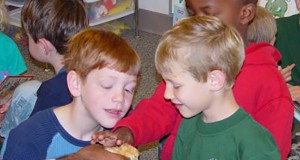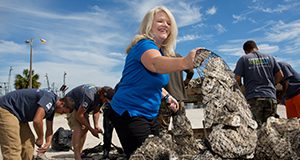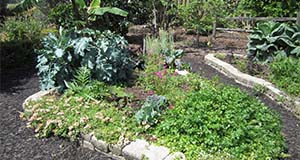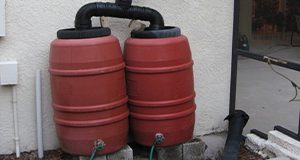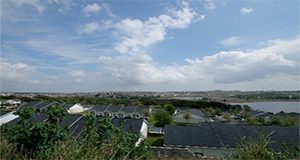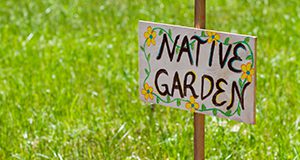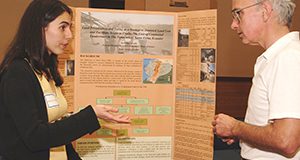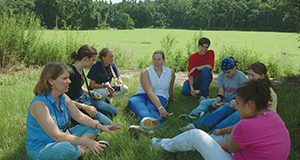School-based programs provide an opportunity to youth who would not be able to participate in traditional 4-H club offerings otherwise. If you want to expand your 4-H program in diversity, subject matter, and/or number of youth reached, school-based programming may be the solution for you. This 6-page document discusses school-based programs, differences between school-based programming and traditional club programming, reasons to start school-based programs, ways to work with school sites, and enrollment for school-based program youth. It is part of the 4-H 101 Fact Sheet series. Written by Vanessa Spero-Swingle and Susan Munyan, and published by the UF/IFAS 4-H Youth Development Department, April 2018.
http://edis.ifas.ufl.edu/4h389
Category: Program Development
Developing and Strengthening Networks to Promote Resilience After Disasters
The HGHC series includes thirteen publications that focus on the work of the community outreach and dissemination team, including community engagement, outreach, and research result dissemination. This 3-page document focuses on developing and strengthening networks before they are challenged to promote resilience in and after a disaster. Written by Angela B. Lindsey, Samantha Goldenberg, and Cassie Wandersee, and published by the UF/IFAS Department of Family, Youth and Community Sciences, April 2018.
http://edis.ifas.ufl.edu/fy1477
Stakeholder-Identified Barriers, Challenges, and Obstacles in Community Gardens
Florida Extension agents play a vital role in assisting community members to start and sustain community gardens through site visits, workshops, and educational events. This 3-page document discusses the results of a Delphi study conducted in order to create a picture of the barriers, challenges, and obstacles to starting and sustaining community gardens in Florida. Written by Susan Webb and John Diaz and published by the UF/IFAS Department of Agricultural Education and Communication, March 2018.
http://edis.ifas.ufl.edu/wc301
Getting Engaged: Program and Event Planning for Clients with Diverse Abilities
For event planners, it is important to be inclusive of people with diverse physical and mental abilities when establishing accommodations for programs or events. This 3-page publication is one in the series Getting Engaged, and will aid Extension professionals and other program/event planners in appropriately accommodating audiences and attendees with various needs. Written by Kathryn Stofer and published by the UF/IFAS Department of Agricultural Education and Communication, March 2018.
http://edis.ifas.ufl.edu/wc299
Recruiting and Retaining Members in Agricultural Organizations
Many organizations struggle with recruiting new members and retaining current members. The UF/IFAS PIE Center conducted membership surveys of the Florida Cattlemen’s Association and Florida CattleWomen to aid both groups in their membership efforts. This 3-page document discusses common membership barriers and practices in order to help agricultural organizations be better equipped to attract new members and keep current ones. Written by Ricky Telg and published by the UF/IFAS Department of Agricultural Education and Communication, March 2018.
http://edis.ifas.ufl.edu/wc300
Instructional Design Using the Dick and Carey Systems Approach
Instructional design is a system of procedures used for developing instruction and training curricula in a consistent and reliable method. This 5-page publication applies the best practices of instructional design using the Dick and Carey systems approach. Written by Tyler D’Angelo, J. C. Bunch, and Andrew Thoron and published by the UF/IFAS Department of Agricultural Education and Communication, March 2018.
http://edis.ifas.ufl.edu/wc294
Rain Barrel Owners: Meeting the Programming Needs of This Unique Extension Audience
Rain barrels make it easy for households to practice water conservation. Extension programs for rain barrel construction, decoration, and giveaways can raise awareness for (and encourage use of) this technology. This 9-page document will provide insight into the behavior and attitudes of rain barrel owners so that Extension professionals may gain a better understanding of this unique audience. Written by Emily Ott, Paul Monaghan, Wendy Wilber, Lynn Barber, and Karissa Raymond and published by the UF/IFAS Department of Agricultural Education and Communication, March 2018.
http://edis.ifas.ufl.edu/wc297
Stakeholder-Identified Community Garden Program Outcomes
Extension clientele often contact agents for expertise on starting or maintaining a community garden; however, agents’ ability to collect meaningful data from these activities can be a challenge. This 3-page publication discusses a statewide study that was conducted by the author to identify community garden outcomes. Written by Susan Webb and John Diaz and published by the UF/IFAS Department of Agricultural Education and Communication, January 2018.
http://edis.ifas.ufl.edu/wc295
How Do Floridians Perceive Their Role in Protecting Water Quality and Quantity Through Landscape Practices?
Florida is faced with challenges in protecting both water quality and quantity; the state’s incredible number of home landscapes can positively or negatively impact water depending on how landscapes are managed. In 2016, Florida residents with irrigated landscapes were surveyed in order to create more effective Extension programs regarding landscape best management practices. This 4-page document discusses the results of this survey. Written by Laura A. Sanagorski Warner, Alexa J. Lamm, and Anil Kumar Chaudhary and published by the UF/IFAS Department of Agricultural Education and Communication, January 2018.
http://edis.ifas.ufl.edu/wc293
Overview of Extension Program Planning Models

The use of program plan development models within Extension has a long history of application based on environmental context, interest, and perceived value. The purpose of this 6-page article is to articulate a comparative overview of the various program planning models designed and employed by Extension professionals in education contexts. Written by John Diaz, Cody Gusto, and David Diehl and published by the UF/IFAS Department of Agricultural Education and Communication, January 2018.
http://edis.ifas.ufl.edu/wc289
Developing a Program Plan Based on the Program Planning Cycle
For over a century, Extension programs have used specific program development plans to create or refine services for clientele. This 6-page article seeks to provide an overview of fundamental tenets within program planning, how a planning process informs a development plan, and why these components are integral to Extension services. Written by John Diaz, Cody Gusto, and David Diehl and published by the UF/IFAS Department of Agricultural Education and Communication, December 2017.
http://edis.ifas.ufl.edu/wc290
Residents' Perceived Landscape Benefits Can Help Extension Promote Good Landscape Management Practices
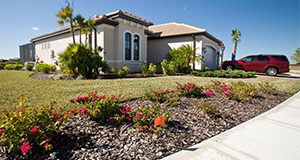
Households can help conserve and protect water resources through irrigation and fertilizer best practices without compromising the quality of their landscape. UF/IFAS Extension, along with Extension services across the country, conducts programs to protect water quality and quantity by educating communities and individuals about research-based landscape practices. This four-page fact sheet describes the results of a survey that can help Extension promote good landscape management practices. Written by Laura A. Warner, Amanda D. Ali, and Anil Kumar Chaudhary and published by the Department of Agricultural Education and Communication.
http://edis.ifas.ufl.edu/wc282
Reframing Leadership
Effective leadership is essential in the businesses where we work, the institutions where we learn and in the communities where we live. Our own leadership is a product of how we see the world. This three-page article looks at Bolman and Deal’s book Reframing Organizations and the different frames to address organizational issues and leadership. Written by Matthew Sowcik, Hannah Carter, and Valerie McKee and published by the Department of Agricultural Education and Communication.
http://edis.ifas.ufl.edu/wc284
Education and Facilitation Methods for Extension
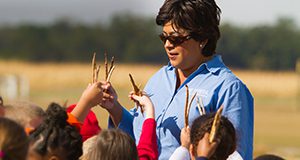
Extension faculty, staff, and volunteers serve a wide variety of stakeholders who learn in myriad ways. Education research provides insight into the effectiveness of such tools, and Extension further encourages flexibility and innovation in methods when facilitating programming. This six-page fact sheet explains how to incorporate new education methods into Extension programming. Written by Kathryn A. Stofer and published by the Department of Agricultural Education and Communication.
http://edis.ifas.ufl.edu/wc281
Enhancing the Success of Extension Programs with the Social Exchange Theory
Social Exchange Theory (SET) is based on the principle that human behavior is an exchange of rewards between people. This three-page fact sheet explains how it can be applied to Extension programming to promote clientele participation in programs and a commitment to changing their behaviors. Written by Amanda D. Ali and Laura A. Warner and published by the Department of Agricultural Education and Communication.
http://edis.ifas.ufl.edu/wc280
Getting Engaged: Resources to Support Community Engagement Practices
This document is part of a series called Getting Engaged (http://edis.ifas.ufl.edu/topic_series_getting_engaged), designed to help Extension and research faculty and other community engagement professionals improve their engagement with a variety of stakeholder audiences. This four-page document offers resources for practitioners at all stages, from those just beginning to think about engagement to those who have been engaging their communities for years. Written by Kathryn A. Stofer and published by the Department of Agricultural Education and Communication.
http://edis.ifas.ufl/edu/wc273
Developing County Associations for School and Community Gardens
Increasingly, gardeners receive attention for the educational, environmental, health, and social impacts that their projects facilitate within schools and communities. Garden associations allow Extension to play a vital role in providing technical information to support new and existing gardens. This three-page fact sheet outlines the framework used by a pilot garden association program in Polk County, Florida. Written by John M. Diaz, Susan Tyler Webb, and Erin Elsberry and published by the Department of Agriculture Education and Communication.
http://edis.ifas.ufl.edu/wc279
Getting Engaged: Improving Your Stakeholder Engagement Practices
This document is part of a series called Getting Engaged (http://edis.ifas.ufl.edu/topic_series_getting_engaged), designed to help Extension and research faculty and other community engagement professionals improve their engagement with a variety of stakeholder audiences. This four-page document provides basic information that will help faculty and other community professionals become more comfortable with engaging various stakeholder audiences. Written by Kathryn A. Stofer and published by the Department of Agricultural Education and Communication.
http://edis.ifas.ufl.edu/wc274
Water Conservation and Extension Participants: An Interesting Synergy
The home landscape is a place where there is a great opportunity for people to adopt irrigation practices and technologies that conserve water. However, a large portion of residents lack the required knowledge and skills to adopt some of those practices. This three-page fact sheet discusses using innovative evaluation approaches to demonstrate the impacts of statewide urban water conservation programs. Written by Laura A. Warner, Sebastian Galindo-Gonzalez, and Anil Kumar Chaudhary and published by the Department of Agricultural Education and Communication.
http://edis.ifas.ufl.edu/wc278
Getting Engaged: Public Engagement Practices for Researchers
A part of the Getting Engaged series that aims to help readers become more comfortable with engaging various stakeholder audiences, this five-page fact sheet is designed for agriscience, natural resources, or other science and engineering faculty with primarily natural or physical science backgrounds who want to get started in stakeholder engagement. Written by Kathryn A. Stofer and published by the Department of Agricultural Education and Communication.
http://edis.ifas.ufl.edu/wc272
